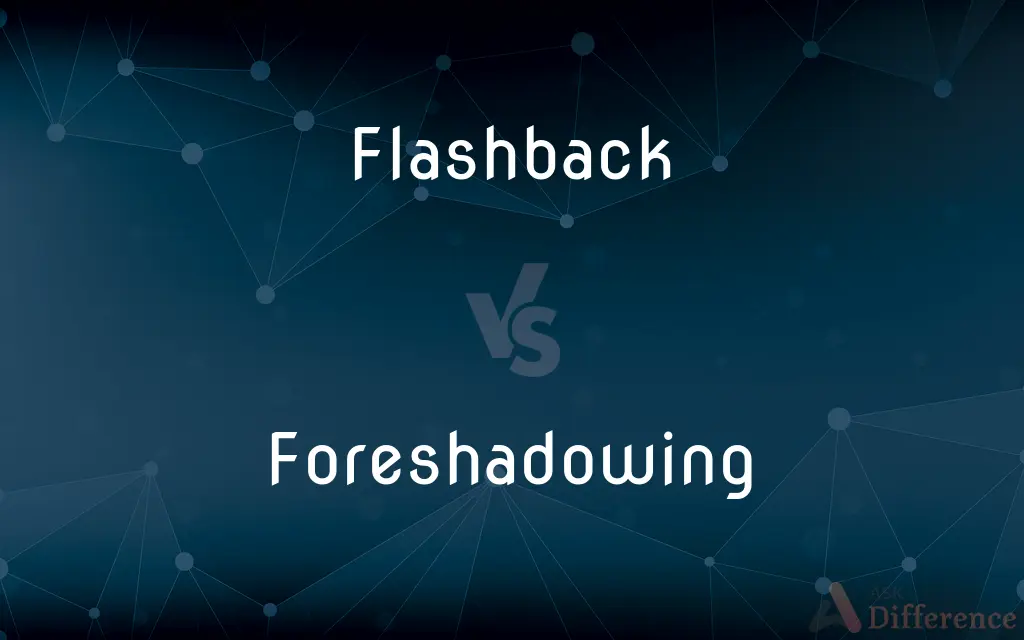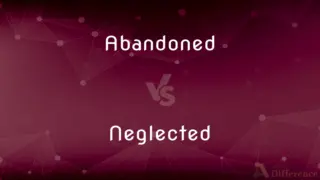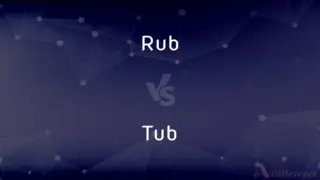Flashback vs. Foreshadowing — What's the Difference?
Edited by Tayyaba Rehman — By Maham Liaqat — Updated on April 21, 2024
Flashback involves presenting events from the past to enrich a narrative, while foreshadowing hints at events that will occur in the future, creating anticipation.

Difference Between Flashback and Foreshadowing
Table of Contents
ADVERTISEMENT
Key Differences
Flashback is a narrative technique used to provide backstory or context by relaying events that happened before the current plot timeline. This technique allows authors to develop characters and plot by revealing crucial historical details. On the other hand, foreshadowing is used to subtly hint or predict events that will happen later in the story, preparing the audience for what’s to come and often enhancing the thematic depth of the narrative.
Flashbacks are often employed to create empathy or add layers to a character's personality, explaining why characters behave in certain ways in the present. They can appear as memories, dreams, or stories told by characters. Whereas foreshadowing is typically more subtle, manifested through dialogue, descriptions, or even the setting, suggesting outcomes that can keep the audience guessing about future developments.
While flashbacks provide a direct window into the past, making previous events explicit and clear, foreshadowing relies on the audience's ability to pick up on clues that may not be immediately apparent. This method builds suspense and engages the audience’s deductive skills.
Flashback sequences can vary greatly in length, from a few lines to whole chapters, depending on their importance to the story’s main narrative. On the other hand, foreshadowing is usually brief and involves small, easily missed hints that are only understood after the foreshadowed events unfold.
In literature, flashbacks are crucial for narratives that span different times or when past incidents are too significant to be mentioned in passing. Conversely, foreshadowing is often used in genres like mystery or thriller to build tension and give clues, which makes the final revelation more impactful.
ADVERTISEMENT
Comparison Chart
Purpose
To reveal past events that shape the present.
To hint at events that will occur later.
Technique
Involves direct depiction of past scenes.
Uses subtle clues and hints.
Effect on Audience
Provides understanding and context.
Creates suspense and anticipation.
Usage in Narrative
Often detailed, can be lengthy.
Typically brief and scattered throughout.
Common in Genres
Historical fiction, biographies.
Mysteries, thrillers, speculative fiction.
Compare with Definitions
Flashback
A method used by writers to give context or background to the current situation.
The author used a flashback to explain the protagonist's fear of water.
Foreshadowing
The use of symbolic elements to suggest plot developments.
The shattered mirror was an early foreshadowing of the family's split.
Flashback
A device in film and literature that transitions from present to past events.
The movie used a series of flashbacks to reveal the character's secret past.
Foreshadowing
An element that creates suspense by hinting at possible outcomes.
Her hesitant glance at the clock foreshadowed her impending departure.
Flashback
A sudden, vivid memory that feels as though it's happening in the present.
She had a flashback to the night of the accident, hearing the tires screech.
Foreshadowing
A subtle warning or indication of what is to come in the story.
The mention of the old, locked attic door was foreshadowing trouble ahead.
Flashback
An interruption in the chronological order of a narrative.
The story’s flashback provides insights into the mysterious character’s motives.
Foreshadowing
A device that builds anticipation in a narrative.
The repeated mentions of a mysterious figure were foreshadowing a major twist.
Flashback
A scene set in a time earlier than the main story.
In the novel, a flashback shows the hero as a child witnessing a crucial event.
Foreshadowing
A literary technique used to hint at future events.
The darkening skies and howling wind foreshadowed the storm’s brutal force.
Flashback
A literary or cinematic device in which an earlier event is inserted into the normal chronological order of a narrative.
Foreshadowing
Foreshadowing is a literary device in which a writer gives an advance hint of what is to come later in the story. Foreshadowing often appears at the beginning of a story, or a chapter, and it helps the reader develop expectations about the upcoming events.A writer may implement foreshadowing in many different ways.
Flashback
The episode or scene depicted by means of this device.
Foreshadowing
To present an indication or a suggestion of beforehand; presage
Hostilities that foreshadowed all-out war.
Flashback
(Psychiatry) A recurring, intensely vivid mental image of a past traumatic experience
Soldiers who had flashbacks of the war.
Foreshadowing
Present participle of foreshadow
Flashback
An unexpected recurrence of the effects of a hallucinogenic drug long after its original use.
Foreshadowing
A literary device whereby an author drops hints or symbolic representations of plot developments to come later in the story.
The roses blooming before Rose herself bloomed was excellent foreshadowing.
Flashback
A vivid memory that arises spontaneously or is provoked by an experience.
Foreshadowing
The act of providing vague advance indications; representing beforehand
Flashback
An experience that has characteristics of an earlier experience.
Foreshadowing
Indistinctly prophetic
Flashback
(authorship) A dramatic device in which an earlier event is inserted into the normal chronological flow of a narrative.
Flashback
(psychology) A vivid mental image of a past trauma or other sensation that the trauma is happening in the present, especially one that recurs.
Flashback
A similar recurrence of the effects of a hallucinogenic drug.
Flashback
The condition of the flame propagating down the hose of an oxy-fuel welding system.
Flashback
(databases) A query that operates against data from an earlier time, before it was changed.
Flashback
(intransitive) To undergo a flashback; to experience a vivid mental image from the past.
Flashback
A transition (in literary or theatrical works or films) to an earlier event or scene; also, the scene thus introduced.
Flashback
An unusually vivid recollection of a prior experience, often one that is traumatic, such as scenes from combat or a criminal assault, or induced by hallucinogenic drugs such as LSD; when accompanied by hallucinations it is called flashback hallucinosis.
Flashback
A transition (in literary or theatrical works or films) to an earlier event or scene that interrupts the normal chronological development of the story
Flashback
An unexpected but vivid recurrence of a past experience (especially a recurrence of the effects of an hallucinogenic drug taken much earlier)
Common Curiosities
How subtle should foreshadowing be in a novel?
Foreshadowing should be subtle enough to not give away the plot but clear enough to be recognized in hindsight.
What is the difference between direct and indirect foreshadowing?
Direct foreshadowing explicitly hints at what will happen, while indirect foreshadowing uses mood, tone, or symbolism as more subtle clues.
Can a flashback be misleading in a story?
Yes, sometimes flashbacks can be used to mislead or surprise the audience, especially in mystery or thriller genres.
How do flashbacks contribute to character development?
They reveal motivations, past experiences, and significant events that define a character’s traits and actions.
What are the risks of using too much foreshadowing in a story?
Excessive foreshadowing can make the plot predictable, reducing suspense and audience interest.
Is there a specific place in the narrative where flashbacks work best?
Flashbacks are most effective when they naturally fit into the story’s flow, often at points where past context enhances the current action or decisions.
What techniques can be used to introduce a flashback in a film?
Techniques include voice-overs, changes in the visual style, or transitions that take the viewer back in time.
Can flashbacks be considered a form of exposition?
Yes, flashbacks often serve as exposition by providing essential background information that helps clarify current plot points.
Can foreshadowing change the way a reader perceives a character?
Yes, foreshadowing can influence perceptions by hinting at hidden traits or future actions of a character, altering how the audience views them.
What type of narrative is most likely to use flashbacks?
Narratives that explore character backgrounds deeply, like historical fiction or complex dramas, frequently use flashbacks.
How does foreshadowing contribute to theme development?
It can subtly reinforce thematic elements, making the eventual thematic revelations more impactful and integrated into the storyline.
How can filmmakers visually distinguish flashbacks from the main storyline?
Through different color grading, visual effects, or framing to indicate that the scene is set in a different time.
How can authors ensure that foreshadowing is effective?
By embedding it seamlessly into the narrative and making sure it aligns with the story’s climax and resolution.
What are the potential drawbacks of using flashbacks too frequently?
Frequent flashbacks can disrupt the narrative flow and confuse the audience if not clearly integrated.
What is an example of foreshadowing in a famous book or movie?
In "Harry Potter and the Half-Blood Prince," the locket found at Sirius's house was a subtle foreshadowing of its importance as a Horcrux.
Share Your Discovery

Previous Comparison
Abandoned vs. Neglected
Next Comparison
Rub vs. TubAuthor Spotlight
Written by
Maham LiaqatEdited by
Tayyaba RehmanTayyaba Rehman is a distinguished writer, currently serving as a primary contributor to askdifference.com. As a researcher in semantics and etymology, Tayyaba's passion for the complexity of languages and their distinctions has found a perfect home on the platform. Tayyaba delves into the intricacies of language, distinguishing between commonly confused words and phrases, thereby providing clarity for readers worldwide.















































